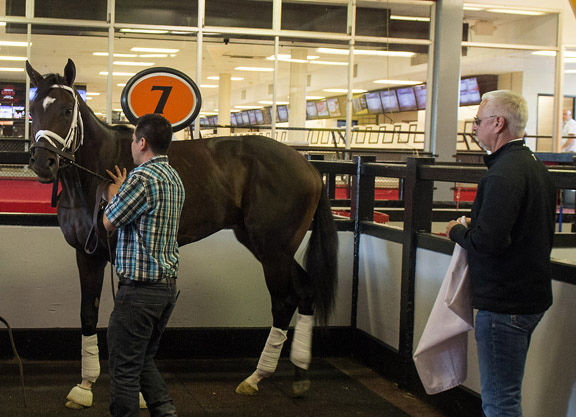By Bill Finley
Even with a 1-for-45 record coming in, the GI Kentucky Derby was right in Todd Pletcher's wheelhouse. He was able to bring Always Dreaming (Bodemeister) into the race the way he likes to bring all his horses into their races, by carefully planning a schedule that includes ample time in between races. Always Dreaming has raced four times this year and his races had the following gaps in between them: 158 days, 38 days, 28 days, 35 days.
Throughout his career, Pletcher has been at the forefront of the theory that it is important to give horses a lot of time off between races. It's a theory that has taken over the sport, at least at the highest levels. He just doesn't run his horses back in two weeks, and now he'll be forced to in the GI Preakness S. Can Pletcher do it? Can a horse who is used to some much time between races do it? Those are the biggest questions facing Always Dreaming as he attempts to win the second leg of the Triple Crown.
The Preakness and Pletcher are just not a good fit. While he has started 48 horses in the Kentucky Derby, he has run only eight in the Preakness and has only hit the board with one, Impeachment (Deputy Minister), who was third in 2000. The more telling stat is that of his 45 Derby starters prior to this year, only three have run back in the Preakness. They are:
As is the case with Always Dreaming, he had to run Super Saver (El Prado {Ire}) back in the Preakness because he won the Derby. If you take him out of the mix, the last time Pletcher ran a Derby horse back in the Preakness was 10 years ago.
According to stats compiled by STATS Race Lens, over the last five years, Pletcher had started only 55 horses with 14 days or fewer between their last start. He won with eight of them for a 15% winning percentage. During the same time frame, he has started 4,368 horses with 15 days or more between races and won with 1,050 of the, good for 24%. Not surprisingly, he does his best work with horses that have been off 91 days or more, winning 28% of the time in the category. But his preferred move is to give them between 31 and 60 days between races. Forty-seven percent of all his starters over the last five years fall into the category.
Pletcher understands that bringing Always Dreaming back so quickly will be a challenge.
“The quick turnaround is always a concern, but we're hoping in this case that what we've seemed from Always Dreaming so far indicates he is going to rebound with another good effort on short rest,” he said on the latest TDN podcast.
He says he also learned some lessons from his experiences with Super Saver.
“The real key is you don't need to do much,” he said. “Someone asked me if there's anything I learned from Super Saver running back in the Preakness. One thing we did with him is give him a little easy breeze at Churchill before we left for Pimlico. In retrospect, I probably wouldn't do that again with him if I had a do over. Super Saver had a fantastic three weeks from the [GI] Arkansas Derby to the to Kentucky Derby. In the two weeks between the Kentucky Derby and the Preakness we didn't feel like we ever got his energy level back to where it was at Churchill. I don't think it mattered what we did. It just wasn't meant to be with him.”
This time, Always Dreaming will go into the Preakness without a post-Derby work and Pletcher shipped him to Pimlico extra early to get him to acclimate–something he didn't do with Super Saver. He also reports that Always Dreaming came out of his Derby win far better than Super Saver did.
It's clear he's trying to figure this out, which is what good trainers do. Always Dreaming is a better horse than Super Saver and this year's Preakness field didn't come up that tough. The horse can win. But as good a trainer as Pletcher is, he is being asked to do something that is not within his comfort zone.
Shaquille O'Neal was a great basketball player, but a terrible free throw shooter. There may not have been a better pure hitter in the game than Tony Gwynn, but he wasn't the guy you wanted coming to the plate when you desperately needed a home run. He averaged less than seven a season. Bill Mott doesn't develop precocious, fast horses. Wesley Ward will never have a barn full of good 6-year-old dirt horses. Nobody is good at everything. A problem with running a horse back on short rest is the closest thing Pletcher has to a weakness. There's no escaping the obvious: it will be a factor Saturday.
Not a subscriber? Click here to sign up for the daily PDF or alerts.







